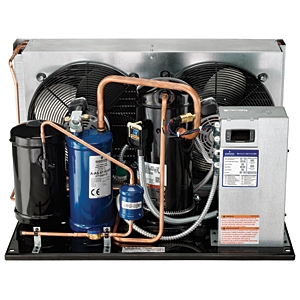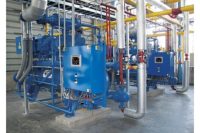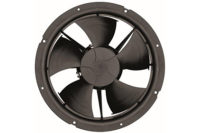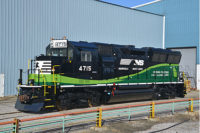It used to be that condensers and evaporators were big, bulky and not even remotely energy efficient. Today, however, advanced technology has allowed “these  big machines” to deliver an improved energy efficiency rating (EER) of up to 15%.
big machines” to deliver an improved energy efficiency rating (EER) of up to 15%.
Refrigerated & Frozen Foods spoke exclusively with Craig Raney, director of marketing, refrigeration for Emerson Climate Technologies, Sidney, Ohio, to find out how today’s condensers and evaporators enhance energy efficiencies.
Refrigerated & Frozen Foods: What kinds of new condensers and evaporators have you developed over the last eight months? What are their applications?
Craig Raney: Last August, we introduced the Copeland Scroll ZSKA compressor for restaurant and convenience store operators. The ZSKA models are intended for extended medium- to high temperature-type duty and are ideally suited for applications such as walk-in, reach-in, coolers, soft serve and frozen carbonated beverage.
This month, we introduced the Copeland Scroll FFAP condensing unit for end-users, contractors, wholesalers and OEMs. The FFAP condensing unit offers the latest technology and uses the efficient Copeland Scroll ZSKA refrigeration compressor and the Emerson Electric Unit Controller on all models. It is suited for applications ranging from floral shops to convenience stores to other retail establishments.
R&FF: What kinds of unique and on-trend characteristics do they provide? Any energy-efficient features?
Raney: The Copeland Scroll FFAP condensing unit comes equipped with the Emerson’s Electronic Unit Controller for built-in diagnostics, precise electronic controls and advanced system protection. It also has a wide operating range of -30˚F to 45˚F evaporator temperature and is designed to work with multiple refrigerants including R-404A, R-134a, R-407C and R-22. The Copeland Scroll FFAP condensing unit also delivers an improved energy efficiency rating of up to 15% compared to standard reciprocating condensing units. It is designed for up to 110˚F ambient temperature and is multi-refrigerant capable.
R&FF: What are some essential attributes that today’s condensers and evaporators must contain in order to meet customer demands?
Raney: The refrigeration market calls for higher efficiency and more reliable products. Aside from that, it is also necessary to meet the need for lower global warming potential refrigerants. Taking these needs into consideration, we introduced the FFAP condensing unit with up to 15% improved efficiency; comes with 70% fewer moving parts and superior liquid handling for unmatched reliability; and designed for multiple refrigerants.
R&FF: What types of challenges does refrigerated and frozen food processors face when installing and using condensers and evaporators? How are you helping them to solve these problems?
Raney: Improved performance and energy efficiency are paramount to our customers. One often ignored method to achieve these goals is through lowering the condensing (or head) pressure in refrigeration systems. The majority of refrigeration systems operate at fixed head pressures, which forces compressors to run at maximum output, regardless of the ambient temperature or demand. For decades, operators have been taught that maintaining fixed head pressures above 105°F was standard operating procedure.
Emerson Climate now offers a low condensing operation that is a viable, energy-efficient and cost-effective alternative to the fixed head pressure method. Technological advances in electronic expansion (EX) valves are enabling existing systems to operate with floating head pressures. EX valves allow customers to lower the condensing points to drastically reduced minimum levels that are more closely aligned with the fluctuations in ambient temperatures throughout the day and across the seasons.
Specific advantages of low condensing include:
• Lower energy consumption/costs.
• Increase compressor capacity at lower condensing pressures.
• Improve sustainability by reducing system charge (refrigerant reduction).
• Maintenance cost reduction.
• Electronic (EX) valve prevents compressor failure from flooding.
• Utility incentives to upgrade system before it fails.




